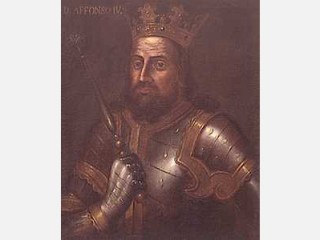
Afonso III Of Portugal biography
Date of birth : 1210-05-05
Date of death : 1279-02-16
Birthplace : Coimbra, Kingdom of Portugal
Nationality : Portuguese
Category : Historian personalities
Last modified : 2010-11-20
Credited as : King of Portugal, ,
The Portuguese king Afonso III (1210-1279) reigned from 1248 to 1279. He completed the conquest of Portugal from the Moslems and presided over the country's first parliaments.
On May 5, 1210, Alfonso was born in Coimbra, the second son of Alfonso II and Urraca. In 1227 he went to France, where he fought as a vassal of Louis IX against Henry III of England and in 1238 married Matilda, Countess of Boulogne.
While Alfonso was in France, a struggle developed in Portugal between his older brother King Sancho II and the Church hierarchy. When Pope Innocent IV directed the Portuguese in 1245 to select a worthier king, the ambitious Alfonso was summoned, and he arrived in Lisbon in early 1246. Alfonso controlled only southern Portugal, and the civil war which broke out soon after his arrival was more hard-fought than his forces had anticipated. But the strong Castilian support desired by Sancho failed to materialize, and he abandoned hope of retaining his crown. Retiring to Toledo, Sancho died there in 1248.
To consolidate his rule over the divided kingdom, the usurper, who was declared king Alfonso III, launched a campaign to free southern Portugal from the Moslems. Faro fell in 1249, and the rest of the Algarve was secured for Portugal according to the terms of a 1253 pact with Alfonso X of Castile. Despite the fact that Alfonso III was already wed to Countess Matilda, he agreed to marry Beatrice, an illegitimate daughter of the Castilian monarch. Although this marriage brought Alfonso III into disfavor with the Church, Beatrice was received by the Portuguese with all the honors of a queen.
The hostility shown to him by supporters of his brother accentuated Alfonso's less noble characteristics—his overweening ambition, his lack of scruples, and his taste for vengeance. He confiscated the lands of Sancho's partisans and favored his own supporters with grants of land and money.
In 1254 Alfonso called the Cortes of Leiria, the first Portuguese parliament to include the third estate (commoners). The Cortes approved a number of fiscal reforms which the King had proposed. Throughout his reign Alfonso cultivated the support of the townsmen by protecting them against abuse of power by nobles and clergy.
Even though he owed his throne to the Pope, Alfonso was by no means a loyal servant of the Church. He opposed the Church's attempts to broaden the authority of the ecclesiastical courts, and he strove to preserve his traditional right to select bishops. Finally, in September 1275, the Pope ordered Alfonso to abide by the promise to obey Church authority that he had made in order to secure papal recognition of his status as Portuguese monarch. The King did not comply and was excommunicated; he maintained his political strength, however, until the end of his reign. After being reconciled on his deathbed to the Church, Alfonso III died in Lisbon on Feb. 16, 1279.
The life of Alfonso III is adequately covered in H.V. Livermore, A History of Portugal (1947). Also useful for general background is Bailey W. Diffie, Prelude to Empire: Portugal Overseas before Henry the Navigator (1960).
















